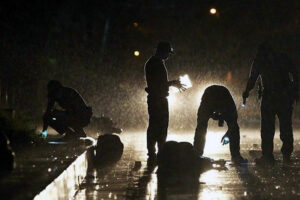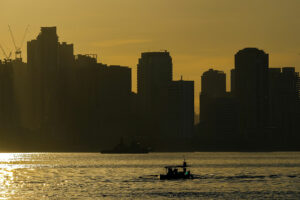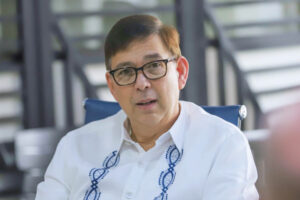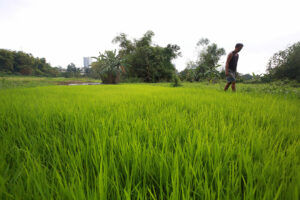THE Philippines is facing heightened scrutiny over its human rights record as a global wave of authoritarianism, accelerated by the so-called “Trump effect” from the US, deepens repression and undermines accountability across the world, human rights group Amnesty International said on Tuesday.
In its State of the World’s Human Rights 2024-2025, Amnesty said harmful trends exacerbated by the second Donald J. Trump administration have compounded local rights crises, including in the Philippines, where 2024 saw forced disappearances, attacks on activists and extrajudicial killings tied to the country’s war on drugs.
Amnesty Secretary General Agnès Callamard called for urgent global efforts to counter the rise of authoritarian laws and practices, warning that failure to act could plunge humanity deeper into crisis by 2025.
“Year after year, we have warned of the dangers of human rights backsliding,” Ms. Callamard said in a separate statement. “But events of the past 12 months — not least Israel’s livestreamed but unheeded genocide of Palestinians in Gaza — have laid bare just how hellish the world can be for so many when the most powerful states jettison international law and disregard multilateral institutions.”
“At this historical juncture, when authoritarian laws and practices are multiplying the world over in the interests of very few, governments and civil society must work with urgency to lead humanity back to safer ground,” she added.
In a Viber message, Presidential Communications Office Undersecretary Clarissa “Claire” A. Castro said she had not sought President Ferdinand R. Marcos, Jr.’s comment on the Amnesty report.
Amnesty said Filipino authorities continued the practice of “red-tagging,” publicly branding activists as communist insurgents despite a Supreme Court ruling that declaring the tactic a threat to life, liberty and security, the group said.
United Nations experts repeatedly urged Manila to denounce the practice, but government bodies including the National Task Force to End Local Communist Armed Conflict continued to use social media, disinformation and the anti-terrorism law against civil society groups, Amnesty said.
Despite this, a Philippine court dismissed the final drug charge against former Senator and human rights defender Leila M. de Lima in June last year.
Ms. De Lima had been detained since 2017 after investigating alleged abuses under former President Rodrigo R. Duterte’s bloody anti-drug campaign.
Impunity for killings tied to the country’s “war on drugs” persisted, Amnesty said.
Data from the University of the Philippines Diliman rights group Dahas showed at least 871 deaths in police operations last year, it said.
Congressional hearings also revealed allegations from former police officials that Mr. Duterte had orchestrated a cash-for-kill system.
The 80-year-old, while denying key accusations, admitted in a Senate testimony to running a death squad during his time as Davao City mayor.
Despite isolated convictions of police officers involved in extrajudicial killings, Amnesty said accountability remains the exception rather than the rule.
While Manila earlier said it would not cooperate with the International Criminal Court (ICC) in probing the drug war and Mr. Duterte, it surrendered the tough-talking leader in March through a diffusion order issued by the International Criminal Police Organization (Interpol).
He is now detained in The Hague where he awaits his trial scheduled for September.
DRUG PROGRAMSAmnesty also criticized the Philippine drug rehabilitation programs, describing these as coercive, nonevidence-based and rife with violations of health and human rights.
On broader issues, Amnesty said a landmark anti-discrimination bill for LGBTQI+ is stalled in Congress, while a proposed law to cap corporate greenhouse gas emissions failed to pass last year.
The President’s creation of a “special committee on human rights coordination” was widely dismissed by human rights groups as inadequate amid deepening domestic and international skepticism.
Globally, the report also cited the unchecked violence in Gaza, widespread crackdowns on dissent, worsening climate inaction and growing hostility toward migrants, women and the LGBTQI+ community.
A wave of authoritarian laws and crackdowns on dissent intensified in 2024, fueling a global backlash against human rights, it added.
Governments increasingly curtailed freedoms of expression, association and peaceful assembly in moves aimed at consolidating power and silencing opposition, Amnesty said.
Authorities worldwide also shut down media outlets, dissolved nongovernmental groups and political parties and detained critics on vague charges of terrorism or extremism.
Human rights defenders, climate activists and Gaza solidarity protesters were among those targeted, reflecting a broader trend of criminalizing dissent to evade scrutiny and instill fear, it said.
Amnesty slammed Mr. Trump’s policies, saying, his government has swiftly and deliberately targeted vital US and international institutions and initiatives that were “designed to make ours a safer and fairer world.”
“One hundred days into his second term, President Trump has shown only utter contempt for universal human rights,” Ms. Callamard added.
The group said the “Trump effect” had eaten away decades of painstaking work to build up and advance universal human rights for all, “accelerating humanity’s plunge into a brutal new era characterized by intermingling authoritarian practices and corporate greed.” — Chloe Mari A. Hufana






